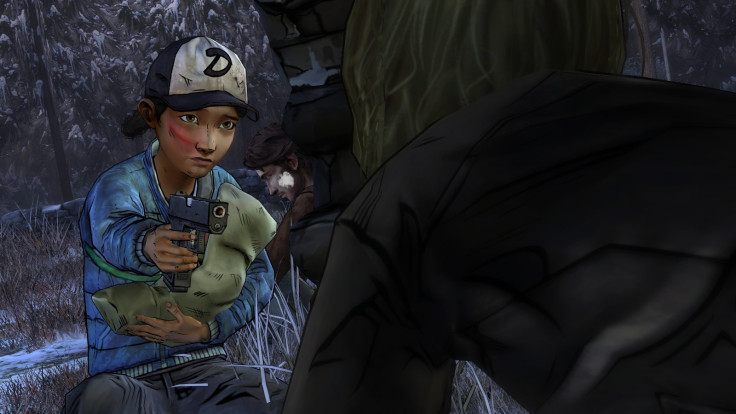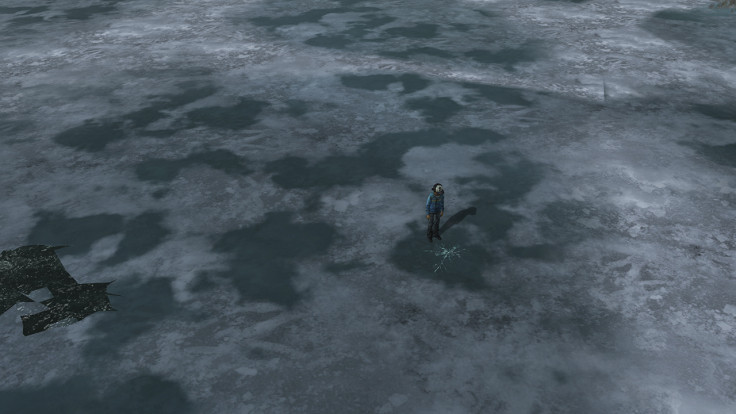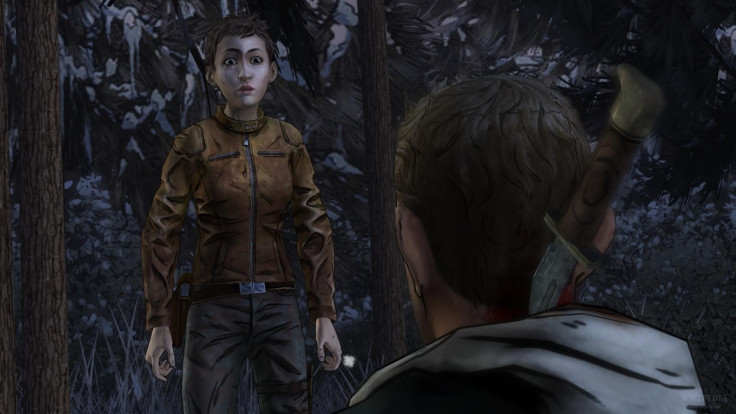The Walking Dead: No Going Back Review

Developer – TellTale Games
Publisher – TellTale Games
Platforms – PS3(tested), Xbox 360, iOS, Android, Microsoft Windows
Release date – Out now
Price - £3.99
The Walking Dead: No Going Back
The best part of The Walking Dead, for me, has always been the screen at the end of each episode where your decisions are compared with the decisions of other players. I like to see what percentage of people did what I did. I like it when I've made a hard but in my opinion practical decision and then see that very few others chose the same way.
It makes me feel special. It makes me feel like I'm one of the chosen few with the brass nads to survive in this world.
But at the end of this final episode, No Going Back, that screen felt like a gut punch. I realised that, appropriately given the title, I'd gone too far. Barely anybody had made the choices I'd made and it hit me that I'd been wrong, that rather than brace and prepare Clementine for the harsh environment, I'd been picking her apart.
There's a beautiful scene, right towards the end, where we flashback to Clem and Lee in season one. It was a chance for me to see her as she once was – happy, optimistic, unburdened. It made seeing her again in the present – seeing what I had done to her – very hard to stomach. I'd taken this young girl and turned her into John McAleese. I was ashamed I didn't behave more like everyone else.
"We just do and carry on"
That's a huge achievement. Guilt is perhaps the rarest emotion in games. Even when committing the most atrocious acts, a la Grand Theft Auto, the writers and designers jump through hoops to make us feel okay afterwards. There are no consequences – no orphaned children. We just do and carry on.

But The Walking Dead has made me feel truly guilty, not specifically for the characters that I hurt or the people that got killed, but for Clementine, who I consistently let down. I don't want to spoil anything, but that's a theme that pervades the game's fiction: the failure of protectors.
The decisions I made in The Walking Dead were disgustingly male, and in the final episode I finally got to see the damage I'd caused
In the end, it's the meatheaded, priapic attitudes of male characters that bring everything to a head. Dumb, masculine, paternal behaviour gets in the way of reason.
In reality, the same was happening. I wanted to be the toughest, the smartest, the one most willing to do what needed to be done, and I destroyed everything. The Walking Dead shares a vision of gender roles with The Last of Us, a game also concerned with how masculine self-interest inversely affects women. But it goes further by directly involving the player in that conversation, by making him – me – one of the men involved in shaping this world.
The decisions I made in The Walking Dead were disgustingly male, and in the final episode I finally got to see the damage I'd caused.
Messy writing
By that measure it's an important game. Anything that sticks a knife in the boisterous world of videogames, or popular culture full stop, is worth studying. But whether The Walking Dead is "good", in the way that marketers like to describe something as good, is another question.

This last episode has a lot of messy writing. Characters unnecessarily come and go and there are a lot of convoluted set-ups. The final choice, poignant though I found it, is very on the nose and there are a few lines that bomb.
One example comes when the group is bedding down for a night at an outdoor camp. Kenny says: "I'm just going to get some air." Clementine replies: "but there's air everywhere." That kind of bad dialogue pulls you out of the scene.
It also feels like there's a lot of filler. As in season one, there are three, maybe four characters who are truly vital. The rest are just functional – they don't really get any solid story beats. Same goes for a lot of the scenes, particularly in this last episode. There's a long sequence involving a pick-up truck and some bags of supplies which could have been trimmed, or maybe cut entirely.
There's a lot of drag and the dialogue doesn't sufficiently pop to keep things entertaining. The Walking Dead is supposed to be miserable, oppressive, but it begins to repeat itself when, even in scenes where the characters are supposed to be on downtime, there isn't much levity in the dialogue.
Truly nerve-racking
This final episode did however boast one of the series' genuine scare moments, involving a blinding snowstorm and a few loose zombies. Trying to navigate around their moans with no visibility was truly nerve-racking.
I didn't cry, I just rested my head on my hand and sighed. I just felt regret
There was some good violence as well. You can define good violence as violence committed against characters who actually have a name and a back-story, violence that makes you wince, or feel at least something. Again, that's a rarity in games, but No Going Back had several on-screen deaths that really stung.
This whole second series has been about Clementine, about what kind of person the world, and by extension, the player, would make her into. That through line has led to a lot of powerful moments, none more striking than in No Going Back. By the time the credits rolled, my Clementine had been transformed fully from an emotional, empathetic person into a computer - an unfeeling survivor.
I didn't cry, as I know a lot of people claim to have done. I just rested my head on my hand and sighed. I just felt regret.
That's a strong feeling, one I don't often get when I'm holding a controller. But The Walking Dead's fixation on Clementine has also hurt this second series. The supporting cast has often felt under-developed, as if they're on-screen purely to serve Clementine's arc.
Of course, she'll always be the focal point of these games, but a little more balance, a little more time spent fleshing out Jane, Kenny et al, would make all of the games' drama that much more potent. As I said earlier, I felt bad for what I'd done to Clementine – not for what she'd done to the other characters. I'm positive that's what Telltale was shooting for but I'm not certain it makes for rounded drama.
Scores:
- Gameplay: 8/10 – Some real scares and bloody, violent moments. There's one small interaction that will really stick with you
- Graphics: 7/10 – Compared to the previous episodes the locations in No Going Back are kind of dull. But that climactic snowstorm sequence looks great
- Sound: 9/10 – Melissa Hutchison continues to shine as Clementine. Again, in the blizzard, those zombie moans really send chills up your back
- Writing: 7/10 – As a conclusion to series two, No Going Back is powerful, meaningful, lasting. But standalone it's a sloppy script
- Overall: 8/10 – A resounding ending to a solid series which asks searching questions about men in games and the people who play them
Want to know what our review scores mean? Have a look at how we review games.
© Copyright IBTimes 2025. All rights reserved.



















